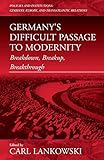Germany's Difficult Passage to Modernity : Breakdown, Breakup, Breakthrough / ed. by Carl Lankowski.
Material type: TextSeries: Policies and Institutions: Germany, Europe, and Transatlantic Relations ; 4Publisher: New York ; Oxford : Berghahn Books, [1999]Copyright date: ©1999Description: 1 online resource (208 p.)Content type:
TextSeries: Policies and Institutions: Germany, Europe, and Transatlantic Relations ; 4Publisher: New York ; Oxford : Berghahn Books, [1999]Copyright date: ©1999Description: 1 online resource (208 p.)Content type: - 9781571812827
- 9781782389903
- 320.943/09/04 23/eng
- JN3971.A91
- online - DeGruyter
| Item type | Current library | Call number | URL | Status | Notes | Barcode | |
|---|---|---|---|---|---|---|---|
 eBook
eBook
|
Biblioteca "Angelicum" Pont. Univ. S.Tommaso d'Aquino Nuvola online | online - DeGruyter (Browse shelf(Opens below)) | Online access | Not for loan (Accesso limitato) | Accesso per gli utenti autorizzati / Access for authorized users | (dgr)9781782389903 |
Frontmatter -- CONTENTS -- Introduction -- Chapter 1 Calvinism and Democracy: The Case of the Dutch Republic (1555-1787) -- Chapter 2 Liberalization and Democratization in Nineteenth and Twentieth Century Germany in Comparative Perspective -- Chapter 3 Germany on the Global Stage: The U.S.-German Relationship after Unification -- Chapter 4 The Politics of Adapting Organized Capitalism: United Germany, the New Europe, and Globalization -- Chapter 5 The “Storm before the Calm”: Labor Markets, Unemployment, and Standort Deutschland -- Chapter 6 The Bundesrat, Interest Groups, and Gridlock: German Federalism at the End of the Twentieth Century -- Chapter 7 Fahrvergnügen on the Datenbahn: Germany Confronts the Information Age -- Chapter 8 Engineered Like No Other: German Society and the Automobile -- Chapter 9 Globalization, Gender, and the German Welfare State: The Maldistributive Consequences of Retrenchment -- Chapter 10 Grace? Under Pressure? The Goldhagen Controversy after Two Years -- List of Contributors -- Index
restricted access online access with authorization star
http://purl.org/coar/access_right/c_16ec
Germany's institutional anatomy, its norms, and the spirits that animate it can only be properly understood if one takes into account such factors as its economic power and central position within Europe. This volume traces the difficult passage of German society to modernity, offering new perspectives on the "German question," largely characterized by the absence of key ideological underpinnings of democracy in the early modern period and a constitutional exceptionalism on the eve of the 20th century. The essays describe the organizational infrastructure and behavioral norms that account for the success of Germany's postwar economy and polity, but also register the tensions between the increasingly individualist outlook of post-1968 Germans and the country's highly organized and ritualistic decision-making structures, which often severely test the democratic foundations of the republic. However, Germany is not unique in its efforts to find a balance between traditional and modern forces that have shaped its history. This volume demonstrates that Germany's experience, past and present, teaches broader lessons that speak to the central concerns of our time: what are the historical precursors of and vital attitudes towards democracy? How much structural variation will be feasible in political economies embedded in Europe after the introduction of the Euro and in the context of economic and other globalization? The considerable insights into these questions provided by this volume celebrate the inspiration given to colleagues and students who have worked with Andrei S. Markovits, to whom it is dedicated.
Mode of access: Internet via World Wide Web.
In English.
Description based on online resource; title from PDF title page (publisher's Web site, viewed 25. Jun 2024)


